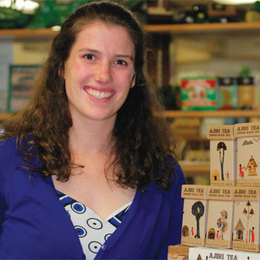
The kitchen table in Sara Holby’s Upper Black Eddy home is a cluttered menagerie of handmade water hyacinth and banana leaf tea labels, magazine beaded twine, brochure drafts and, of course, two cups of steaming black Ajiri Tea. Holby launched her nonprofit tea company, designed to employ impoverished women and educate orphans in Kenya, last year and named it Ajiri, which means “to employ” in Swahili.
The 24-year-old has just returned from a two-and-a-half week trip to Kenya, where she visited tea farms and met Ajiri’s Kenyan employees. Today she’s catching up on the work that accumulated while she was away.
“Now is a slower time for sales,” she says as she spoons sugar into her tea cup, “which is okay because we’re getting ready for the World Tea Expo and there’s a lot of work to do.” The expo, one of the largest events in the global tea industry, is in Las Vegas on June 11. Holby and her mother—and business partner—Ann, will represent their nonprofit tea company at the expo, with hopes that their presence will spark sales in a broader market.
Since its debut at the Milford Community Day last October, sales of Ajiri Tea have spread to more than 90 locations throughout the tri-state and New England regions.
“Business owners are really receptive to the tea,” Holby says. “I think carrying Ajiri shows that they care about this sort of thing, and it’s something different.”
The concept behind Ajiri Tea came to Holby while she was working for an non-governmental organization in Kenya that suddenly, without warning, lost its funding. “The people who had relied on this organization for food and for medication were suddenly cut-off,” she says. It was an event that caused her to consider ways beyond aid to help impoverished people in western Kenya, particularly the women and children. With the help of her mother, her younger sister, Kate, and her Kenyan coworker, Nick Myogo, the mission of Ajiri Tea was born.
“The basic idea behind Ajiri Tea is to create employment instead of giving handouts,” Holby says. Currently 63 women in rural villages in Kenya reap the benefits of that employment. The women design and hand craft hundreds of labels and packaging materials for the tea, which is shipped from a factory in Kenya to Holby’s Bucks County home.
Profits from tea sales in the U.S. are donated to the Ajiri Foundation, a 501(c)3 non-profit that supports orphan education in Kenya. The foundation buys school supplies such as mattresses, wash basins, uniforms, school books and any other miscellaneous resources the orphans would otherwise be unable to acquire.
“In February, the Ajiri Foundation sent the first six orphans to school,” Holby says. “Our goal is to continue to employ women in the area and to send as many orphans to school as possible. We’ve committed to these orphans through the end of high school at least, and we would like to add additional students each year.”
Ajiri Tea is a rich, black tea grown in more than 10,000 small-scale farms in the Kisii district of Kenya. When Holby pours herself a cup, she admits, “I’m getting a little addicted.” And she’s not the only one.
Thanks to her persistent marketing and promotional efforts—Holby personally meets with every health food store, coffee shop, gourmet food store, gift shop and restaurant owner where Ajiri is sold—the local and regional taste for Ajiri is developing.
If the World Tea Expo goes as well as they hope, their production model will need to expand to meet the increased demand. The Holbys are currently looking into consigning the packaging responsibilities elsewhere in order to increase their productivity. They glue all of the labels onto the 100 percent post-consumer recycled cardboard tea boxes, and prepare the tea for sale by hand in their dining room. That step of the process requires many hours of Holby’s time, which she would rather spend promoting and selling the tea.
“Today I went to the Center for Educational Advancement in Flemington to discuss passing on the packaging duties to them,” she says. The CEA provides employment and teaches job skills to people with disabilities or social disadvantages. By utilizing the helping hands at CEA, Ajiri would be providing employment to yet another group of people, bringing part of the Ajiri mission a little closer to home.
Manasseh Franklin is a professional writer based in Bucks County. Rob Hall is a freelance photographer from Plumsteadville.
Where you can buy Ajiri Tea:
Grapevine Natural Grocery 5 N. State Street, Newtown Healthy Habit 57 Bridge St., Milford, N.J.
Homestead General Store 1650 Bridgeton Hill Road, Upper Black Eddy
House of Coffee Route 263 and Street Road, Lahaska
La Maison Cheese 51 West State Street, Doylestown
The Talking Teacup 301 West Butler Pike, Chalfont



